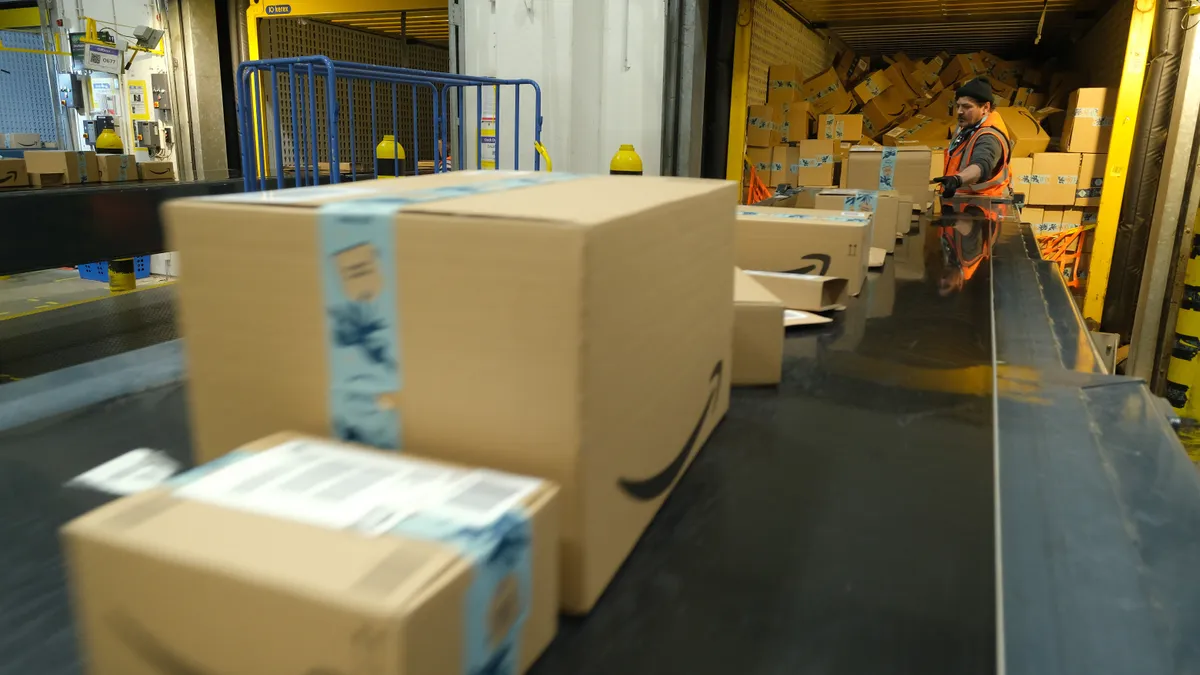Dive Brief:
-
Amazon on Thursday missed Wall Street's expectations for its second quarter, reporting that online store sales in the period rose 16% year over year to $53.2 billion, while physical store sales rose 11% to $4.2 billion. Total net sales (which includes the company's AWS operations and other non-retail revenue) rose 27% to $113.1 billion, per a company press release.
-
Revenue from services for its third-party marketplace sellers rose 38% to $25.1 billion; subscriptions (including Prime membership, music streaming and other fees) rose 32% to $7.9 billion; and "other," which includes advertising, rose 87% to $7.9 billion.
-
Marketplace growth outpaced the company's own retail sales growth, CFO Brian Olsavsky said during a call with analysts. Net income rose 48% in the period to $7.8 billion, per the release.
Dive Insight:
E-commerce took off during the pandemic as consumers were locked out of or avoided stores, but its growth has ebbed as lockdowns have eased. That was true at Amazon even in a quarter that included its annual Prime Day sale, which Olsavsky said added 400 basis points to the company's year-over-year growth in the quarter.
But its brick-and-mortar sales did benefit from the return to stores, posting uncharacteristically healthy growth. And margins were healthy, boosted by sales growth in services offerings.
"Amazon's media and advertising business unit is definitely one to watch — it provides the ability to buy ads on search results pages across the Amazon ecosystem," Andy Halliwell, senior director of retail at digital consultancy Publicis Sapient, said in emailed comments, noting that it's already a $1 billion business.
Although GlobalData Managing Director Neil Saunders sees Amazon as a company that "will keep winning customers and will keep driving the whole retail market forward," he also noted that, when it comes to traditional retail — selling products to consumers — the e-commerce giant is also increasingly running into stiff competition.
"[O]n the product side, Amazon is now entering an era of heightened competition in which many more retailers have expanded their online and multichannel capabilities," he said in emailed comments, noting that most large legacy retailers have invested in their e-commerce and are competitive on swift delivery or in-store fulfillment. "While this does not completely undermine the convenience delivered by Amazon's superior logistics capability, it signals the start of a more concerned effort by traditional retailers to fight back in a more concerted way."
Saunders believes that should undermine the antitrust scrutiny from the White House and Congress, but Halliwell sees the regulatory interest in Amazon as a potential weakness, along with "any uncertainty" that may come from the leadership transition with Jeff Bezos gone as CEO.
"Perhaps the biggest shadow over the long-term success of the business may be around ethics and sustainability," Halliwell also said, "but otherwise expectations for the business remain high and it seems there is no slowing down this astonishing engine of growth."















